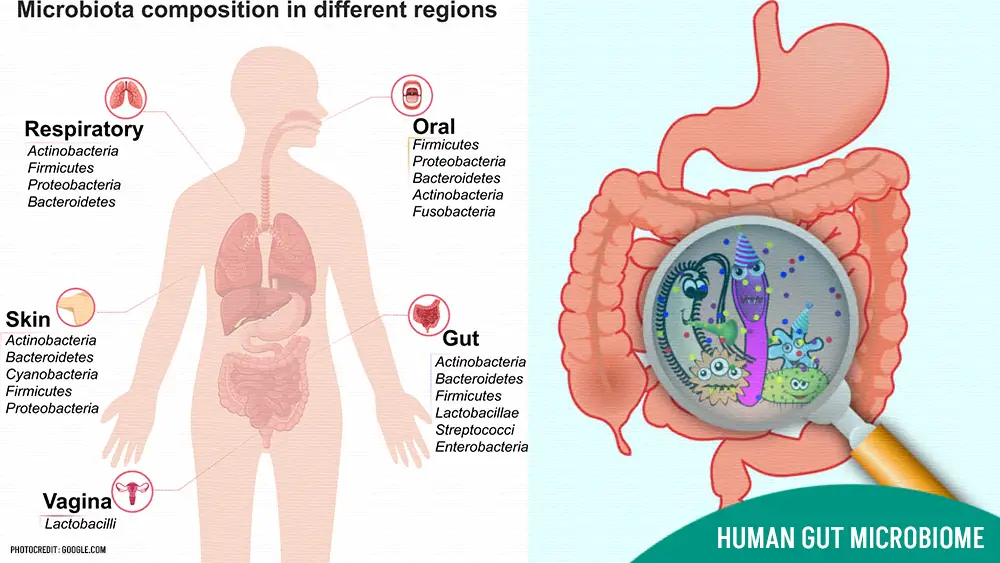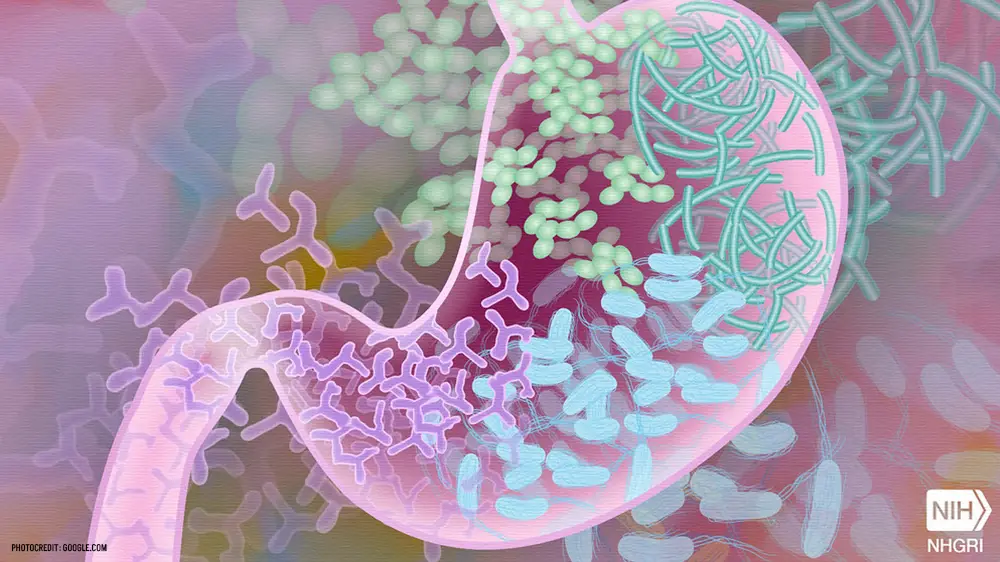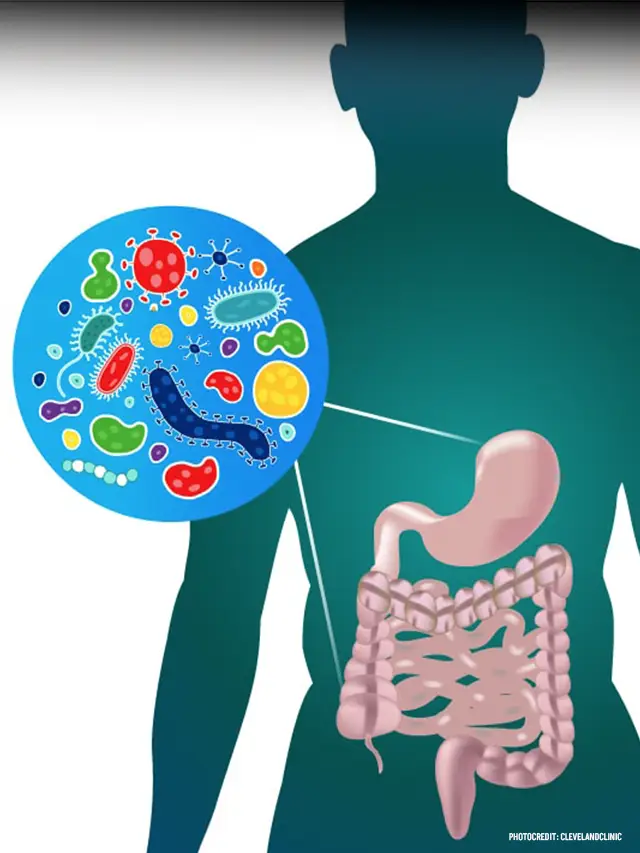
HEALTH NEWS
The Human Gut Microbiome: Exploring the Hidden Ecosystem Within
-
 Rahul Priydarss
Rahul Priydarss - March 4, 2024
Discover expert tips and strategies for maintaining a human gut microbiome. Learn how to support digestive health, boost immunity, and promote overall well-being through diet, lifestyle, and environmental choices. Take control of your gut health today!
What is the Human Gut Microbiome:
The human gut microbiome is a complex ecosystem of microorganisms residing within the gastrointestinal tract. Comprising bacteria, viruses, fungi, and other organisms, it forms a diverse community that interacts with the body in multifaceted ways. From aiding in digestion to influencing immune function and even affecting mental health, the gut microbiome plays a pivotal role in maintaining overall health and well-being. Understanding its composition and functions is crucial for appreciating its profound impact on human physiology and disease.

Table of Contents
Detailing of Microbiota or Human Gut Microbiome:
The origin of “microbiota” can be dated back to the early 1900s. It was found that many microorganisms, including bacteria, yeasts, and viruses, coexist in various human body sites (gut, skin, lung, and oral cavity). In addition, the human microbiota, also known as “the hidden organ,” contributes over 150 times more genetic information than that of the entire human genome. Although “microbiota” and “microbiome” are often interchangeable, there are certain differences between the two terms. Microbiota describes the living microorganisms found in a defined environment, such as oral and gut microbiota.
The Vital Role of the Human Gut Microbiome:
In recent years, scientists have increasingly recognized the critical role of the human gut microbiome in maintaining overall health. This complex ecosystem of microorganisms residing in our digestive tract influences numerous aspects of our well-being, from digestion and immunity to mental health and metabolism.
Understanding the Gut Microbiome:
The gut microbiome consists of trillions of bacteria, viruses, fungi, and other microorganisms that inhabit our gastrointestinal tract. This diverse community works in harmony, interacting with our bodies and performing essential functions that contribute to our health.
Digestive Health: One of the primary functions of the gut microbiome is aiding in digestion. These microorganisms break down dietary fibers and other compounds that our bodies cannot digest on their own, helping us extract nutrients from food and maintain regular bowel movements.
Immune System Support: Additionally, the gut microbiome plays a crucial role in supporting our immune system. By interacting with immune cells and influencing immune responses, it helps protect against harmful pathogens while promoting tolerance to beneficial microbes.
Brain-Gut Connection: Emerging research has unveiled a bidirectional relationship between the gut and the brain, often referred to as the “brain-gut axis.” The gut microbiome communicates with the central nervous system through various pathways, affecting mood, cognition, and behavior.
Metabolic Regulation: Furthermore, the composition of the gut microbiome can impact metabolic health. Imbalances in the microbiota have been linked to conditions such as obesity, diabetes, and cardiovascular disease, highlighting the importance of maintaining a diverse and balanced gut microbiome.
Factors Influencing the Gut Microbiome:
Several factors can influence the composition and diversity of the gut microbiome, including diet, lifestyle, medications, and environmental factors. Consuming a varied diet rich in fiber, minimizing stress, getting enough sleep, and avoiding unnecessary antibiotic use is essential for supporting a healthy gut microbiome.
Promoting Gut Health:
Fortunately, there are steps we can take to promote gut health and support the diversity of our microbiome. Eating a diet rich in fruits, vegetables, whole grains, and fermented foods provides the necessary nutrients and beneficial bacteria to nourish our gut microbiota. Additionally, incorporating probiotic supplements or foods into our diet can help introduce beneficial strains of bacteria.
Factors Influencing the Human Gut Microbiome:
The human gut microbiome, a complex ecosystem of microorganisms residing in the gastrointestinal tract, is influenced by various factors that impact its composition and function. Understanding these factors is essential for maintaining gut health and overall well-being.
Diet: Diet plays a significant role in shaping the gut microbiome. Consuming a diverse range of fruits, vegetables, whole grains, and fiber-rich foods provides essential nutrients for microbial growth and diversity. On the other hand, a diet high in processed foods, sugar, and saturated fats can negatively impact the microbiome, leading to imbalances and reduced microbial diversity.
Lifestyle: Lifestyle factors such as stress, physical activity, and sleep patterns can also influence the gut microbiome. Chronic stress can disrupt the balance of beneficial bacteria in the gut, while regular exercise has been shown to promote microbial diversity. Adequate sleep is essential for maintaining a healthy gut microbiome, as sleep deprivation can alter microbial composition and increase inflammation.
Medications: Certain medications, particularly antibiotics, can have a profound impact on the gut microbiome. Antibiotics work by killing harmful bacteria, but they can also eliminate beneficial bacteria, leading to dysbiosis and potential health issues. Other medications, such as proton pump inhibitors and nonsteroidal anti-inflammatory drugs, may also alter the gut microbiome and contribute to digestive disturbances.
Environmental Exposures: Environmental factors, including exposure to pollutants, toxins, and pathogens, can influence the gut microbiome. Chemicals found in pesticides, plastics, and pollution have been shown to disrupt microbial balance and contribute to gut inflammation. Additionally, infections caused by bacteria, viruses, or parasites can temporarily alter the composition of the gut microbiome until balance is restored.
Age and Genetics: Age and genetics can also impact the gut microbiome. As we age, changes in diet, lifestyle, and health status can affect the composition and diversity of our microbial communities. Additionally, genetic factors play a role in determining an individual’s susceptibility to certain gut-related conditions, such as inflammatory bowel disease or irritable bowel syndrome.

Health Effects of an Imbalanced Gut Microbiome:
An imbalanced human gut microbiome, characterized by disruptions in the composition and diversity of microbial communities in the gastrointestinal tract, can have profound effects on health. From digestive issues to immune dysfunction, various aspects of well-being can be impacted by dysbiosis in the gut microbiome.
Digestive Disorders: One of the most apparent health effects of an imbalanced gut microbiome is the development of digestive disorders. Conditions such as irritable bowel syndrome (IBS), inflammatory bowel disease (IBD), and gastroesophageal reflux disease (GERD) are often associated with alterations in the gut microbiota. Dysbiosis can lead to symptoms such as abdominal pain, bloating, diarrhea, constipation, and indigestion.
Immune Dysfunction: The gut microbiome plays a crucial role in regulating the immune system, and disruptions in microbial balance can lead to immune dysfunction. An imbalanced gut microbiome may contribute to chronic inflammation, autoimmune disorders, and increased susceptibility to infections. Additionally, alterations in the gut microbiota have been linked to allergies, asthma, and other immune-related conditions.
Metabolic Disorders: Imbalances in the gut microbiome have been implicated in the development of metabolic disorders such as obesity, type 2 diabetes, and metabolic syndrome. Dysbiosis can affect energy metabolism, appetite regulation, and insulin sensitivity, contributing to weight gain, insulin resistance, and dyslipidemia. Furthermore, imbalances in the gut microbiota have been associated with increased production of inflammatory compounds and alterations in gut barrier function, which can further exacerbate metabolic dysfunction.
Mental Health Conditions: Emerging research has highlighted the connection between the gut microbiome and mental health. An imbalanced gut microbiome has been linked to mood disorders such as depression, anxiety, and stress. The gut-brain axis, a bidirectional communication system between the gut and the brain, plays a crucial role in regulating mood and behavior. Disruptions in this axis, due to dysbiosis in the gut microbiome, can contribute to alterations in neurotransmitter levels, neuroinflammation, and mood disturbances.
Skin Conditions: The gut microbiome also influences skin health, and imbalances in microbial communities can contribute to the development of skin conditions such as acne, eczema, and psoriasis. Dysbiosis in the gut microbiome can lead to systemic inflammation and alterations in immune function, which may manifest as skin inflammation and dermatological symptoms.
Maintaining a Healthy Human Gut Microbiome:
A healthy gut microbiome is crucial for overall well-being, as it plays a vital role in digestion, immune function, metabolism, and even mental health. By adopting certain lifestyle habits and dietary practices, you can support the diversity and balance of your gut microbiome, promoting optimal health and vitality.
Eat a Diverse and Fiber-Rich Diet: Consuming a wide variety of fruits, vegetables, whole grains, legumes, nuts, and seeds provides essential nutrients and fiber that nourish beneficial bacteria in the gut. Aim to include a rainbow of colors on your plate, as different plant foods contain unique types of fiber and phytonutrients that support microbial diversity.
Include Fermented Foods: Incorporating fermented foods into your diet, such as yogurt, kefir, sauerkraut, kimchi, and kombucha, introduces beneficial probiotic bacteria that can help populate the gut microbiome. These fermented foods also contain prebiotic fibers that feed existing beneficial bacteria, further promoting microbial balance.
Limit Processed Foods and Added Sugars: Highly processed foods, refined sugars, and artificial additives can negatively impact the gut microbiome by promoting the growth of harmful bacteria and reducing microbial diversity. Opt for whole, minimally processed foods whenever possible to support a healthy gut environment.
Manage Stress: Chronic stress can disrupt the balance of beneficial bacteria in the gut and impair digestive function. Practice stress-reducing techniques such as mindfulness meditation, deep breathing exercises, yoga, or spending time in nature to support both mental and gut health.
Get Adequate Sleep: Quality sleep is essential for maintaining a healthy gut microbiome, as it allows for proper restoration and repair processes to occur. Aim for 7-9 hours of uninterrupted sleep per night to support optimal gut function and microbial balance.
Exercise Regularly: Regular physical activity has been shown to promote microbial diversity and support a healthy gut microbiome. Aim for a combination of aerobic exercise, strength training, and flexibility exercises to reap the full benefits for both your gut and overall health.
Avoid Unnecessary Antibiotics: Antibiotics can disrupt the delicate balance of the gut microbiome by killing off both harmful and beneficial bacteria. Only use antibiotics when necessary and follow your healthcare provider’s recommendations regarding dosage and duration. Additionally, consider taking probiotics during and after antibiotic treatment to help replenish beneficial bacteria.
Stay Hydrated: Drinking an adequate amount of water throughout the day is essential for maintaining optimal gut function and supporting microbial balance. Aim to drink at least 8-10 cups of water daily, and hydrate with herbal teas, infused water, or coconut water for added variety and hydration benefits.
FAQs about Human Gut Microbiome:
A1: Symptoms of an imbalanced gut microbiome may include bloating, gas, diarrhea, constipation, and frequent infections. Consulting with a healthcare professional can help determine if dysbiosis is a contributing factor.
A2: Yes, foods rich in probiotics, prebiotics, and dietary fiber can support a healthy gut microbiome. These include yogurt, sauerkraut, garlic, onions, bananas, whole grains, fruits, vegetables, and legumes.
A3: Yes, chronic stress can disrupt the balance of the gut microbiome, leading to dysbiosis and potential health issues. Practicing stress management techniques such as meditation, yoga, and deep breathing exercises can help mitigate these effects.
A4: While probiotic supplements can be beneficial, it’s also essential to consume a diverse range of probiotic and prebiotic foods to nourish the gut microbiome naturally.
A5: The timeline for restoring a healthy gut microbiome can vary depending on factors such as diet, lifestyle, and the severity of dysbiosis. Making dietary and lifestyle changes to support gut health can lead to improvements over time.

-Please remember, to always consult with healthcare professionals or Doctors for personalized advice related to medical conditions.
Conclusion:
The human gut microbiome plays a vital role in our overall health and well-being, influencing everything from digestion to immune function and mental health. By understanding the factors that affect the microbiome and taking steps to maintain its balance, we can support optimal health and vitality.




